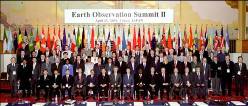|
|
German contribution to the Group on Earth Observations and the establishment of the Global Earth Observation System of SystemsGEOSS in brief :: About GEO :: About D-GEO :: European contributions - Copernicus and INSPIRE :: German Contributions :: Documents :: News |
About GEO
|
Documents and Links |
In consequence of the resolutions of the G8 summit in Evian in June 2003 to promote international cooperation in the field of earth observation, the first "Earth Observation Summit" (EOS) took place in Washington D.C. on July 31st, 2003. Upon invitation of the US government high-level representatives from more than 30 states as well as international organizations met, in order to discuss the establishment of globally coordinated earth observation system. A declaration called for support of the following points:
In consequence an international working group (ad hoc Group on Earth Observations) was set up to coordinate the basic documents to GEOSS. As intermediate step a framework document was accepted on the 2nd Earth Observation Summit on 25 April 2004 in Tokyo. The GEOSS 10- year implementation plan was finally adopted at the
3rd Earth Observation Summit on 16 February 2005 in Brussels. Since its first plenary session in May 2005, GEO assembles governments and international organisations with mandates in Earth Observations on a voluntary basis with the objective to establish the a Global Earth Observation System of Systems. An Executive Committee manages its activities between plenary sessions at strategic level, whereas a Programme Board manages the GEO Work Programme. A secretariat has been established at the World Meteorological Organisation (WMO) in Geneva. The first Ten Year Implementation Plan has been guided by further Earth Observation Summits at Ministerial level 2007 in Cape Town/South Africa; 2010 in Beijing/China and 2014 in Geneva/Switzerland. At the latter, the extension of GEO's mandate for another ten year period has been decided. The Earth Observation Summit 2015 in Mexico City eventually approved a new GEO Strategic Plan 2016-25./p> By the end of 2018, GEO had 105 Member States and 118 Participating Organizations. The basis of GEO's work is laid down in multi-annual Work Programmes, which are approved by plenary, strategically guided by the Executive Committee and managed by the Programme Board. The latest GEO Work Programme 2017-19 comprises four Flagship Initiatives(GFOI, GEOGLAM, GEOBON und GOS4M) and another 30 or so GEO Initiatives. which are closely related to important global agendas, such as the UN Agenda 2030 on Sustainable Development, the UN Conventions on Climate Change, Biodiversity and Combat Desertification (UNFCC, CBD, UNCCD) the Minamata Mercury Convention and the G20 Action Plan on Agriculture and Food Security. These Initiatives are underpinned by Foundational Tasks to coordinate the underlying Observation Systems, to provide a technical Data Infrastructure, and to foster Data Sharing and Management Principles, and Capacity Building for Earth Observations. |

